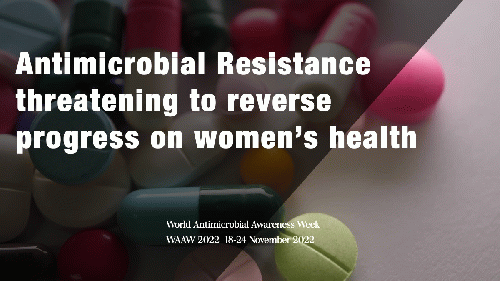Antimicrobial resistance threatening to reverse progress on women's health
SHOBHA SHUKLA - CNS
India is a leading consumer of antibiotics and hence also carries a huge burden of drug-resistant pathogens. Between 2000 and 2015, its antibiotic consumption increased by 103%, from 3.2 to 6.5 billion defined daily doses. Not just antibiotic use rose, but also resistance to antibiotics and other antimicrobials. A recent Government of India's Indian Council of Medical Research (ICMR)'s report points to a sustained rise in antimicrobial resistance in India, with an increase in the number of drug-resistant pathogens, making certain infections difficult to treat with available medicines or impossible to treat. This trend is a warning bell for all of us to take stringent measures against the irrational and irresponsible use of antimicrobials.
Women are at increased exposure-risk of antimicrobial resistance during pregnancy, abortion or childbirth
Increasing antibiotic resistance raises women's risk of exposure to antimicrobial resistance during pregnancy, abortion and childbirth, especially when these events take place in healthcare settings without safe or hygienic conditions. A number of experts who were interviewed by CNS around 2022 International Conference of Family Planning (ICFP 2022) point towards this worrying trend.
"Women are exposed to drug resistant microbes when in the hospital for obstetric and gynaecological interventions or procedures, like DNC (dilation and curettage) or MTP (medical termination of pregnancy) or for a normal delivery or a caesarean section delivery," said Professor Amita Pandey, a leading gynaecologist working in one of the top government-run tertiary-care hospital of India, in an exclusive interview to CNS. Prof Amita Pandey is among the Academic Editors of Asian Research Journal of Gynaecology and Obstetrics, and Professor in Department of Gynaecology and Obstetrics, King George's Medical University (KGMU).
Based on her clinical experience, after analgesics, antibiotics are the second most abused group of drugs in India. "It is indeed a shame that antibiotics are prescribed 'right, left and centre', even when not needed, in many healthcare facilities."
(Note: You can view every article as one long page if you sign up as an Advocate Member, or higher).






